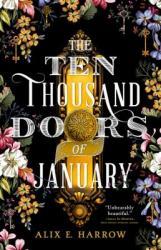
This beautiful work of art, is a love letter to stories and bibliophile’s everywhere. I loved Harrow’s intoxicating magical debut so much that I blew through it in 4 days! I read it back in March but it still sticks with me to this day! But I have to admit, I have been a hard time finding words to describe this magical beautiful experience of a book because it grabbed my heart so completely and did so much to me, that to try to express it in words and to remember all the intricate details has been difficult. But I am happy to report I am currently doing a re reading and so far it is just as magical, heartbreakingly tender and beautiful as the first time. I am so excited that it has finally come out and more people get to experience this epic journey into unknown worlds. This should be on everyone’s reading lists!
Meet January Scaller, a brown girl, an in between sort of thing some call her, growing up in the 1900’s a time rife with social change, and colonialism. A difficult time where the world is in transition and nothing is at it seems. January is the ward of a wealthy white benefactor, Mr. Locke, who spends his waking moments hunting for the worlds artifacts and then selling them to the highest bidder. Or more truthfully, employing people like January’s father to hunt down these treasures, so he can sell them. As a result, his sprawling estate resembles a museum decorated with treasures and all sort of odd things from around the world. Being taught to always be the good girl, she is tollerated in Mr Locke’s society but still she feels like a artifact herself.
With her father gone for months at a time and Mr. Locke attending to meetings, January grows up alone, content with wandering the lonely grounds and halls to be among it’s treasures and discover its secrets. One day when she was 7, playing amidst the wide open fields of the estate, she discovered a door, a blue ragedy door that hadn’t looked like it had been used in ages, and she wished for it to lead to elsewhere, using a old diary she had found. Next thing she new, she was stepping from the familiar into a new world unknown. When she was was older, in the same place she found the diary, she discovered a mysterious book that spoke of secret doors, other worlds, and adventure. As the pages keep turning January discovers connections and truths to her own story, that she never would have imagined and is led into a adventure of a lifetime.
Full of beautiful imagery and entrancing atmospheric prose, this story exhibits the best things I love about books and fantasy in general. Prose that flower off the page and into the reader’s imagination, a coming of age tale, a magic system based in words and stories, other lands, a wild, beautiful, strong heroine who has trouble fitting in and conforming to standards, dastardly villains, sweet friendships, and a heart of love and family at it’s center.
Stories have a way of communicating deeper truths that can’t be understood and communicated in any other way. And their is so much in this book! A imaginative tender hearted lonely adventuresome girl full of all the desires that young girls have, the yearning to be loved both romantically and by a father, and the desire to be part of a grand adventure in unknown new exciting places. This story communicates hope for better things and the understanding that their is something more. It communicates love and the need for family and belonging, it communicates the importance of discovering identity and sticking to your truths no matter what. And it communicates so many other truths that are at once both universal but at the same time, personal as stories speak to each of us differently and discovering what they say, is part of the adventure.
And everyone should go on this adventure! Everyone should read this intricate, tender hearted, complex, magical, tale that will sweep your heart between it’s pages and not let it go, even after the last page is turned.
Thank you to Orbit publisher for my ARC of this wonderful tale for review!
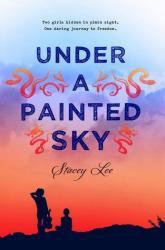
Under a Painted Sky is a fictional western story set in 1849 on the Oregon Trail. It is about two girls named Samantha and Annamae who after some unfortunate luck leave their home, Missouri, behind to start a new life, but they must first survive the Oregon Trail. While traveling along the Oregon Trail, Samantha and Annamae disguise themselves as boys to avoid unwanted attention and they join a group of cowboys, but will Samantha and Annamae be able to trust them? Under a Painted Sky is a story about friendship and self-discovery that leaves you wanting to read more. Overall, I really enjoyed reading Under a Painted Sky because Stacy Lee developed the characters very well and I would recommend reading it.
Reviewer Grade: 8
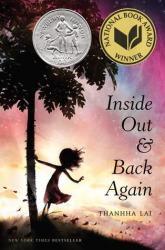
Inside Out and Back Again is a historical drama all told in poems. A Vietnamese family is forced to flee their home in Saigon, Vietnam due to the outbreak of the Vietnam war. Luckily, they escape and flee to Alabama, however, Ha, the daughter in the family has trouble adjusting to the different lifestyle in the U.S. In, this book, you get a view into the life of Vietnamese refugees and their struggle to adjust to a new life, all in the form of poems. I would recommend this book to anyone looking for a great story filled to the brim with poems.
Reviewer Grade: 8
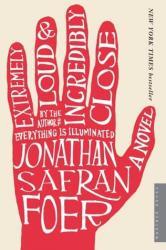
Extremely Loud & Incredibly Close follows a nine-year-old boy named Oscar coming to terms with life after his father's death on 9/11. When looking through his dad's things, Oscar breaks a vase and finds a key and a mysterious envelope labeled "Black". He decides to embark on a mission to find every person named Black in New York City in an attempt to find the one Black who knew his father. Along the way, he meets new friends and discovers more about those he already knew. This book is written from the alternating perspectives of Oscar, his grandmother, and his mute grandfather whom Oscar has never met. This adds an interesting layer to the story, as Oscar lost a parent in 9/11 and his grandparents, both children at the time, lost their families in the bombing of Dresden. This shows a theme throughout this book that grief from war and terror is universal. This book's overall commentary on the human experience and grief, both individual and collectively experienced by a nation, shows the skill and thoughtfulness of the author. On a personal level, I did not find the characters particularly enticing and had a hard time following the plot at times, but I would still recommend the book, especially to someone with an interest in 9/11 or the world wars.
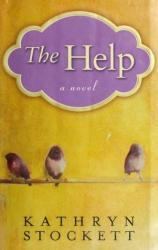
The Help is a novel set in Jackson, Mississippi during the early 1960's, written by Kathryn Stockett. The main character, Eugenia 'Skeeter' Phelan, is a aspiring journalist who lives with her parents and has no intention of starting a family like all of her friends; what she really wants is to be a writer. She decides to take a big risk and interview the help--the African American women who work in the households of white families to make a living--and write about their experiences. Kathryn Stockett's novel follows the lives of three women: Skeeter and two African American women: Aibileen and Minnie. The Help is spectacularly written and very accurately depicts society during segregation. It will make readers laugh out loud, cry, and connect with the characters. The plot is unpredictable and enjoyable, told through several perspectives which creates the perfect character development.
I strongly recommend this book to all readers who enjoy historical fiction.
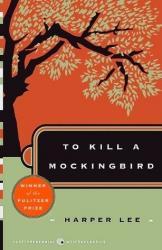
This is a story that beautifully represents society in a way few novels can. Set in Maycomb, Alabama in the early 1930's, it is told from the perspective of a 6-year-old girl, Scout, as she grows, plays, and gets into trouble with her older brother, Jem, and comedic friend, Dill. Scout's wise father, Atticus, must defend an innocent black man accused of rape; along the way Scout meets people and learns things that impact her life. Meanwhile, Scout, Jem, and Dill, are determined to learn more about their mysterious neighbor and the violent rumors that surround him--sometimes getting themselves into humorous situations--and learn something surprising. The book is spectacularly and wisely written, with characters readers will connect with, and themes that are important in all readers' lives: courage, empathy, and the power of standing up for what you believe in. Scout's sense of humor and insightful observations will make readers think and keep turning the pages for more.
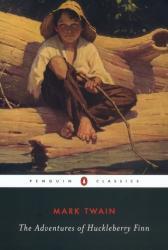
A classic piece of literature, The Adventures of Huckleberry Finn by Mark Twain is a wonderful depiction of life along the Mississippi river and times past. Huckleberry Finn is a wild, adventurous, and self-sufficient young man who finds his way along the river with an escaped slave. Stealing, superstitions, and deception all describe the journey Huck Finn and Jim take together. They encounter rivaling families, con artists, and Tom Sawyer in their attempt to get north. Mark Twain paints a vivid picture of life in the South with slavery in a way that shows that not everyone believed the same thing. A truly fun and interesting story, The Adventures of Huckleberry Finn is a book that will interest even the most disinterested reader.
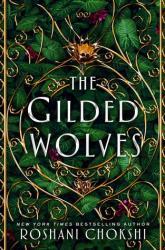
The Gilded Wolves is an excellent adventure-mystery novel set in an alternate Paris that details the adventures of a team of misfits as they perform heists in an attempt to reclaim things they had lost. Each character is represented in the book with chapters from their perspective. This format allows for the reader to engage with the many different characters on a personal level by reading their personal thoughts and getting the details of their past that isn’t expressed in other parts of the book. The storyline of this novel is very interesting and keeps you hooked with the mystery and suspense. This novel is incredibly enjoyable and I would highly suggest it.
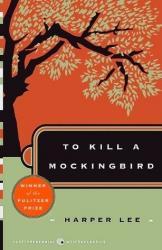
To Kill a Mockingbird is truly a masterpiece of American literature.
Along the lines of Tom Sawyer and Huckleberry Finn, Harper Lee presents us with a coming of age story set in 1930s Alabama. Scout and Jem Finch explore their hometown, get into trouble, wonder about the mystery of Boo Radley, and are faced with a great challenge when their father must prove a man to be innocent. Atticus Finch, Scout and Jem's father, is a wholehearted, unprejudiced role model who always stands up for what is right and who anyone can learn a lesson from. Overall, I understand why many schools require their students to read this book as it is wonderful literature for all generations.
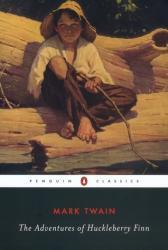
You are slowly floating down river on a warm summer night. You have no worries as you gaze at the endless stars above you. You had a simple day; catching fish to eat and lazily laying in the sun as you float wherever the river takes you. This is the life of Huckleberry Finn.
I gave this book three out of five stars because it was good however it wasn't good enough for me to consider it one of my favorite books. I appreciated the multiple conflicts, the complexity of having several conflicts at once made the book interesting. The characters were all well developed even side characters had underlying intents, and backgrounds.
Additionally, the relationships between the characters was engaging, I especially enjoyed the dynamic between Huck and Jim. Finally, I really enjoyed the internal conflict of Huck as he traveled with a slave. Huck's moral conflict from a society being raised in a society that supports slavery was striking as a 21st century teenager. Despite the positive elements of "The Adventures of Huckleberry Finn" it is only pretty good because I couldn't relate to the characters and the book lacked an emotional connection that would make it one of my favorite books. Regardless, you should read this book for to develop an understanding of the culture of the past.
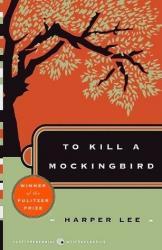
To Kill a Mockingbird, by Harper Lee, is a fantastic novel that examines the racism present in the South during the Great Depression. The book includes several remarkable instances of justice being served to the widespread prejudice present, which captures the reader. All of the character are well developed and serve well in their roles, especially the main protagonist. The entire setting is also intriguing and forms a solid foundation for the plot. Overall, I would recommend this book to anyone as it is a fascinating tale about Southern life.
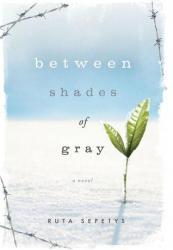
Taking place during WWII... Lina, a fifteen-year-old girl, lives a peaceful and normal life drawing and going to school but when the NKVD, better known as Soviet officers, force them to leave, adventure and chaos abduct Lina's normal lifestyle. Lina, her brother Jonas, and her mom Elena have to travel by train living with the bare minimum to survive off of. From Soviet officers forcing them to work to stealing food to survive, Lina has to find a way to outlast WWII and the capture of her family. Her main goal through all this; to find her dad. This dramatic adventure written by Ruta Sepetys will pull you off your seat.
Reviewer's Age: 15
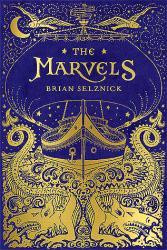
This book begins on a ship at sea with a boy named Billy Marvel. He survives a terrible shipwreck and later finds work in a London theatre. There his family lives for generations as brilliant actors--some who are the best kind of people, some who are awful people. All of the family are actors and love the stage and spotlight until young Leontes Marvel. He hates acting, misses his cues, and can’t remember his lines. His parents are ashamed and banish him from the stage. He decides that his destiny lies somewhere else so he runs away.
A century later, Joseph Jervis, another runaway, finds a place to stay with an uncle in London. Grumpy Uncle Albert and his strange but beautiful house lure Joseph on a search for clues. He begins to think that he might be related to the Marvels and begins an incredible adventure to find out who he truly is.
I really enjoyed this book. During the mystery, I felt like I was right alongside Joseph as he found clues to his mysterious past. I am happy that I figured out the mystery before Joseph did. The story had a very sad ending, but overall stayed pretty bright. I would recommend this book to anyone who likes Brian Selznik’s other books, mysteries, or heartfelt books.
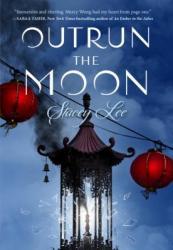
I tore through this book. Mercy is strong and inspirational, but also displays characteristics not normally seen in fictional characters. All of the girls seem ahead of their time and are well-rounded and friendly. Mercy does not have everything handed to her on a silver platter, and she must work for what she wants. This book is realistic, fits the time period, and is very interesting.
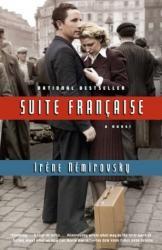
Suite Francaise is an interesting book detailing the experiences of multiple characters and what they face as they evacuate Paris and deal with the German occupation of France. I read this book for school but still found it very interesting. It was a bit slow at first with exposition of characters in almost every chapter. I did enjoy getting to see how different classes reacted to having to leave their homes and what they faced afterwards. Not only does Nemirovsky use multiple characters to show the difference in experience, but also her use of imagery and figurative language add to the essence of struggle. Overall, I enjoyed this book but wouldn't have chosen it myself.
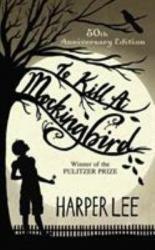
To Kill a Mockingbird is a well thought out, very deep and well executed book. Although it contains some very strong language, I'd say this is a must read for any teenager. Set during the time of the depression, this book deals with many political issues such as racism while also managing to teach very important lessons along the way. The complicated sentence structure in the book, as well as the vocabulary serve to make it a very fun and chalenging read. In my opinion this book is truly one of the best written in history.
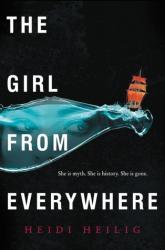
In "The Girl From Everywhere," sixteen-year-old Nix and her father lead a crew of time travelers abroad their ship, the Temptation, in a quest to find a way to save Nix's late mother. I really enjoyed this book -- I was hooked from page one. I think what really pulls you in is the complexity of the time travel -- in this story, they use maps of places during specific time periods to reach where they want to go. It's such an interesting concept that I hadn't seen before this story. I also really liked the crew -- they were all very diverse with interesting backgrounds and personalities. If I had one complaint, it's that Nix's love interest, Kashmir, is sort of your typical YA love interest -- suave, charming, sometimes abrasive, a little arrogant. Maybe it's just because this is a really common archetype in YA, but I found his character a little irritating. Nevertheless, this is an incredible story that is definitely worth checking it.
Grade: 12
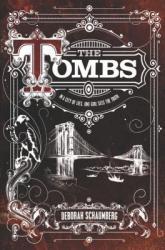
The Tombs is a story told from the perspective of Avery Kohl a girl in New York 1882. I found this book was a very enjoyable read. It had a very interesting air of mystery. I also loved the feeling of being unsure about what she would do next. I first noticed this book by its cover and then I read the summary on the back and found it to be very interesting. I would definitely recommend this book to others looking for a interesting read. I would recommend this book for ages 13-15.
Reviewer Grade:9
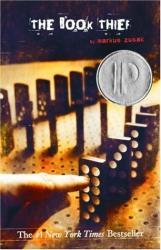
The Book Thief is a very well known book/movie and for good reason.
This story follows a young girl living in Nazi Germany who deals with her family hiding a Jewish man, the book burning's, and her own insatiable love for reading. The Book Thief gives an interesting perspective of World War II that we don't often see in historical novels with a story about a blind follower of the Nazi Regime but who also sympathizes with Jewish people. I really enjoyed this book as someone who loves WWII history and personal stories. I highly suggest this book to any reader, I think it is a very important story to read.
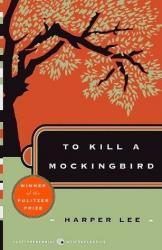
This book is an examination of racial tensions and living as someone who defies the social norms to do greater good. It follows a small family that consists of a father and his two children. The father, a lawyer, becomes the first white man in his time and area to defend a black man in court, alienating himself and his family from the rest of their society (because he did what was practically unspeakable in the town's eyes). A fascinating series of events ensue, in which the children grow up learning what it feels like to feel prejudice and can thus empathize with the struggle that colored people around them face. The father must sacrifice his social standing and endure hatred and threats because he chooses to defend the truth, rather than the race. All in all, I would recommend this book not only for its complex and very interesting plot, but also for its analysis of racism and human nature in regards to the greater good and a sense of humanity. Themes of empathy and sacrifice then escalate the plot to its famous and unexpected finale. It is worth the read even only for the father's speech in court towards the end of the book, where he makes his case in favor of a colored man. I would give this book five out of five stars.
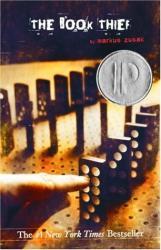
This book follows a young girl living in Nazi Germany, whose family harbors a Jew hiding out from the secret police. Facing prison time, shame, or even loss of life, the girl and her family must be immensely careful to remain neutral and non-proactive. Any anti-Nazi actions, which were quite subjective and meaningless actions, sometimes, could be used against people.
Not to mention, people were being oppressed based on physical appearance and mannerisms, alone. The Jewish man, though, educates the young girl and becomes her best friend. When he chooses to leave their family, due to not wanting to put them in danger and also being in increasing danger himself, the girl faces loss she has never known before. The plot escalates until Germany is liberated by the Allied powers, and the girl grows up to tell warning tales of Nazi-like power regimes and social inequality. This book is fantastic, especially because it has recurring themes of morality, power struggles, humanity, and love or sacrifice. The plot is fascinating with many historical attributes and the characters are so well depicted that the book reads like an old story. I would recommend this book to anyone looking for a deep thought kind of books but also something with an entrancing story and an amazing writing style. I only give it four out of five stars because I personally struggle with conflict areas of war in books and more intense or dark themes. Otherwise, fantastic read!
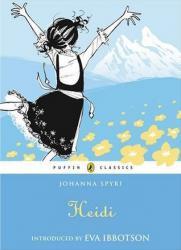
It was very engaging. With young energetic Heidi and her best friend Klara, it pulls you in and engages with life lessons and memorable quotes. With grandmother and Heidi up on the mountainside, they share poetry, hymns, stories, and love. With Heidi's loveable attitude and glow of Christ everywhere, she tries to turn grandfather's grumpy attitude to a loving, caring grandpa. This book is worth reading and engaging for ALL ages.
Reviewer Grade: 9th
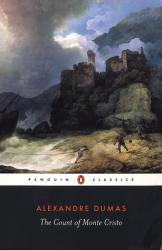
This book is amazing. The story follows the tale of Edmond Dantes and his quest for revenge against the three men responsible for his incarceration. It is a very simplistic concept, but upon reading the novel one will find a book filled with characters that live and breathe, action that is relentless, and many subplots threaded throughout the novel in intricate ways. The book, while extremely long, is entertaining all the way through. The ending is satisfying and ends the book well. I would recommend this book for anyone who is a fan on action novels, or revenge novels.
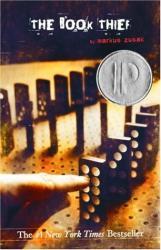
The Book Thief is a novel set over the World War II period. It tells the story of a young orphan, named Liesel. She arrives to her new home with her foster parents, Hans Hubermann and Rosa Hubermann. As she lives there, her love for books begins to grow. Taking risky steps, she steals books from many others, even rescuing one from a pile of burning books of the Nazi bonfire.
As time passes by, Liesel and her family secretly shelter a Jewish boy from the father that had once saved the life of Liesel's father, Hans.
This book was well written and enjoyable to read. It took the perspective of two significant characters, Liesel and Death, which offers a standpoint that the reader could decipher themselves. In addition, with the inclusion of dry humor and insightful observations it would demonstrate a more impactful feeling towards the reader with the overall fate of the characters and the story. This is an important detail, that adds much more feeling that is captivating and interesting.
The Book Thief was a book that could not be predictable, nor fast paced.
Rather it was slow and every turn of direction the story had felt dangerous and worthwhile. It is important for the reader to understand it slowly, however is contradictory to the fact that it is highly captivating to want to see what will happen next. The Book Thief is personally a very well written book and is one of my favorites.
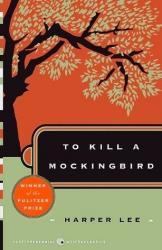
To Kill A Mockingbird is a book set in the early 1930s that describes the story of a family in the quiet town of Maycomb in Alabama. Currently suffering in the Great Depression, Scout Finch and her brother, Jem, live with Atticus, their widowed father. During the summer, Finch, Jem and their neighbor Dill explore their street to find an eerie house owned by a man named Mr. Nathan Radley. They learn that he has been living their for years with a brother, Arthur, and has never ventured outside.
The book took a simple setting and turned it into an exciting and intriguing plot line. It was unpredictable for the courses of events that took place, where it was never boring and was continuously captivating.
Personally, I enjoyed most about the creative plot line and course of events that happened in the book. It is an extremely unique book that is in an uncommon time setting, which creates a more enjoyable experience. This is one of the best books I have read.
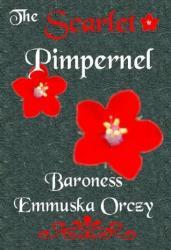
The Scarlet Pimpernel is a wonderful book that incorporates the idealism of the French Revolution to create a unique setting. The historical adventure story is filled with a great blend of suspense, thrills, and romance. The developments included in the story are well-executed and the characters are all full of life. The overarching plot is also intriguing and will captivate the reader until the end of the book. Overall, I would recommend this book to anyone, especially those who like a bit a history.
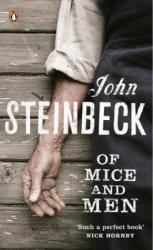
Of Mice and Men is a true classic. It is a gripping tale of friendship and tragedy that takes place during the Great Depression. Lennie and George are very well-developed characters and their story of fulfilling their American Dream is one that you won't want to put down. Of Mice and Men is a surprisingly short read, but its story is enormous. While the book does include some controversial topics, it is still a very good read that I would recommend to anyone.
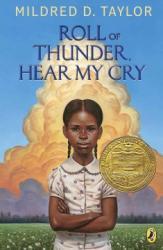
"Roll of Thunder, Hear My Cry" is about an African American family living in the South during the Great Depression who faces the daily struggles of racism. The novel is told through their oldest child's, Cassie Logan, point of view. The Logans own their land and are successful which makes them a prime target for lynching or other racist acts. Cassie's family perseveres through the situation due to their independent lifestyle.
I wouldn't recommend "Roll of Thunder, Hear My Cry". I found the book extremely boring and uninteresting, but other people might not. I read this book with my class because I had to. I couldn't relate to any of the characters, however what the Logans faced can relate to other people. In my opinion it was predictable and it was by far not the best book I have read this year. "Roll of Thunder, Hear My Cry" is not a bad book I just found it boring.

"Keeping Corner" by Kashmira Sheth is about a young Indian girl named Leela who struggles with the unfair traditions of her culture. She is about to get married and everything seems to be going well until her fiance is bitten by a poisonous snake and dies forcing Leela to become a widow. Since she is a widow she must keep corner which is an Indian tradition for female widows where women and young girls must stay inside for a year, shave their head, remove their jewelry, etc. While she is forced to keep corner she sees how unfair things really are and that she must use her voice to make a difference.
I would recommend this book. "Keeping Corner" really made me realize the unjust things women have to go through in other countries. I read this book for a geography project, but I ended up liking it. I couldn't relate to Leela but I could relate to her brother because when he tried to introduce modern ideas no one listened to him or valued what he was trying to say. The book was not predictable. "Keeping Corner" is the best book I have read so far this year.
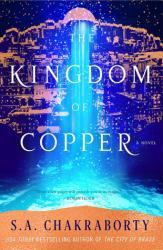
Kingdom of Copper is the sequel to City of Brass, and there are spoilers for that book ahead.
Kingdom of Copper picks up about five years after the events of City of Brass. Nahri is married to Muntadhir and is navigating court politics and learning to use her skills as magical healer. Ali, after getting exiled from Daevabad following the events of City of Brass, has managed to survive several assassination attempts and has made a life for himself in a small village. Forced to return to Daevabad, Ali quickly returns to his post as resident trouble maker/possible emir (which in this case means heir to the throne), and Nahri finds her world rocked once again.
The complex, Middle Eastern inspired world and world-building that were the best part of City of Brass are still present in this book, while they are less of a focal point. Overall, I much preferred Kingdom of Copper to City of Brass. My short review of City of Brass read as something like: "great worldbuilding, annoying characters, promising ending." But because we had that time jump of five years, our characters have separated, matured (at least a bit), and the love triangle that brought down the first book died a satisfying death. The worst part of the first book to me was the romantic angst, and little of that exists in this sequel to the betterment of the book.
TLDR: If you liked the first book, you’ll love this one. If you were on the fence about City of Brass as I was, know that the sequel is much improved.
Kingdom of Copper would appeal young, new and other adults and fantasy readers who like rich world building and a unique setting. 3.5 stars.
Thanks to HarperVoyager for the advance edition, which I received in exchange for an unbiased review. Kingdom of Copper is available now!